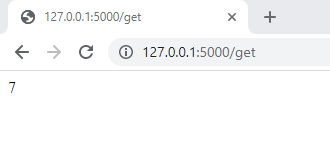Flask Cookies
Last Updated :
05 Feb, 2023
Flask is a lightweight, web development framework built using python language. Generally, for building websites we use HTML, CSS and JavaScript but in flask the python scripting language is used for developing the web-applications.
To know more about Flask and how to run an application in Flask: Flask – First Application Creation
What are Cookies?
Technically, cookies track user activity to save user information in the browser as key-value pairs, which can then be accessed whenever necessary by the developers to make a website easier to use. These enhances the personal user experience on a particular website by remembering your logins, your preferences and much more.
For running a flask application, we need to have some prerequisites like installing the flask.
Prerequisites:
Use the upgraded version of pip by below command in your terminal. In this article, I am using Visual Studio Code to run my flask applications.
Python -m pip install –upgrade pip
Python -m pip install flask
Setting Cookies in Flask:
set_cookie( ) method: Using this method we can generate cookies in any application code. The syntax for this cookies setting method:
Response.set_cookie(key, value = '', max_age = None, expires = None, path = '/', domain = None,
secure = None, httponly = False)
Parameters:
- key – Name of the cookie to be set.
- value – Value of the cookie to be set.
- max_age – should be a few seconds, None (default) if the cookie should last as long as the client’s browser session.
- expires – should be a datetime object or UNIX timestamp.
- domain – To set a cross-domain cookie.
- path – limits the cookie to given path, (default) it will span the whole domain.
Example:
Python3
from flask import Flask, request, make_response
app = Flask(__name__)
@app.route('/setcookie')
def setcookie():
resp = make_response('Setting the cookie')
resp.set_cookie('GFG','ComputerScience Portal')
return resp
app.run()
|
Running the code in Visual Studio Code application.

My Visual Studio Code terminal
Output: Go to the above-mentioned url in the terminal -For Example – http://127.0.0.1:5000/route-name. Here the route-name is setcookie.

Output
Getting Cookies in Flask:
cookies.get( )
This get( ) method retrieves the cookie value stored from the user’s web browser through the request object.
Python3
from flask import Flask, request, make_response
app = Flask(__name__)
@app.route('/getcookie')
def getcookie():
GFG = request.cookies.get('GFG')
return 'GFG is a '+ GFG
app.run()
|
Output:
Login Application in Flask using cookies
Let’s develop a simple login page with Flask using cookies. First, we are creating the main python file – app.py in our code editor. Next, we will create the UI of our web page which is Login.html where the user can enter his username and password. In this app.py, we are storing the username as cookie to know which user logged in to the website. In the below code, we are requesting the stored cookie from the browser and displaying it on the next page which routes to user details page.
app.py
Python3
from flask import Flask, request, make_response, render_template
app = Flask(__name__)
@app.route('/', methods = ['GET'])
def Login():
return render_template('Login.html')
@app.route('/details', methods = ['GET','POST'])
def login():
if request.method == 'POST':
name = request.form['username']
output = 'Hi, Welcome '+name+ ''
resp = make_response(output)
resp.set_cookie('username', name)
return resp
app.run(debug=True)
|
Login.html
HTML
<!DOCTYPE html>
<html>
<head>
<title>Login</title>
</head>
<body>
<form method="post" action="/details">
<label for="username">Username</label>
<input type="text" name="username" id="username"/>
<br/>
<br>
<label for="password">Password</label>
<input type="password" name="password" id="password"/>
<br/>
<br>
<input type="submit" name="submit" id="submit" value="Login"/>
</form>
</body>
</html>
|
Output:

Login Page

User Logging

User Logged In and Cookie Tracker
From the above image, the user can also see the cookies of a website. Here, ‘username’ is the key and its value is ‘Greeshma’ which reminds us that cookies are generally key-value pairs. To see the cookies in your browser, click the last 3 dots on the browser’s right corner>> More Tools>>Developer Tools>>Application window.
Getting website Visitors counted through cookies
In the below code, we want to know the number of visitors visiting our website. We are first retrieving the visitor’s count by the usage of cookies. But there is no variable named visitors count that we created previously. As this key(visitors count) is not present in the dictionary, it will take the value of 0 that is specified in the second parameter as per the dictionary collection in python. Hence, for the first-time visitors count=0, then incrementing the count according to the user’s visit to the website. The make_response( ) gets the response object and is used for setting the cookie.
Python3
from flask import Flask, request, make_response
app = Flask(__name__)
app.config['DEBUG'] = True
@app.route('/')
def vistors_count():
count = int(request.cookies.get('visitors count', 0))
count = count+1
output = 'You visited this page for '+str(count) + ' times'
resp = make_response(output)
resp.set_cookie('visitors count', str(count))
return resp
@app.route('/get')
def get_vistors_count():
count = request.cookies.get('visitors count')
return count
app.run()
|
Output: Url – http://127.0.0.1:5000

Output
Url for below output- http://127.0.0.1:5000/get

Visitors count output using cookies
In the above output screenshot, the value of the website visitors count is retrieved using request.cookies.get( ) method.
Cookies Tracking in Browser –

Cookie Tracker for visitors count application
The flask cookies can be secured by putting the secure parameter in response.set_cookie(‘key’, ‘value’, secure = True) and it is the best-recommended practice to secure cookies on the internet.
Like Article
Suggest improvement
Share your thoughts in the comments
Please Login to comment...